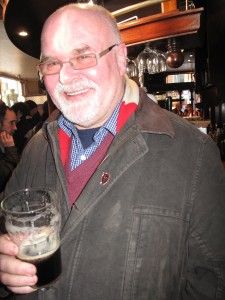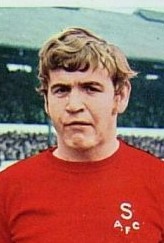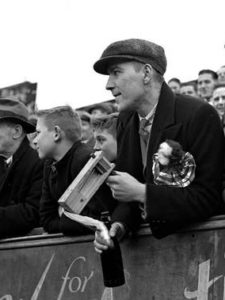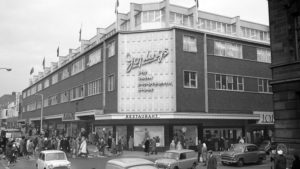Here in the second part of his series, “inspired” by our calamitous performances this year, Pete Sixsmith looks back at Sunderland’s previous relegation seasons by recalling the one that took place at the end of a decade that saw flower power and skinheads, the first moon landings and the first heart transplant.

RELEGATION 2 1969-70
After the shock of being relegated in 1958 it took Sunderland six long years to get back. Alan Brown remained in charge throughout, gradually building a side which many would say was the best they have seen at either Roker Park or The Stadium of Light, made up of players who bought into the Brown philosophy and who fell in love with the club and the area.
Brown’s departure on the eve of the 1964-65 season was a shock and the bond between manager, players and the club was broken. For the next four seasons Sunderland never finished above 15th and had a couple of genuine relegation scares. In 1968 the Board parted company with Ian McColl, brought Brown back from Sheffield Wednesday and he did enough to drag the team to the relative security of 15th place.
The next season saw a promising start which came to nothing as we finished four points above the drop zone (2 down and 2 points for a win in those days) and it saw four notable exits. George Herd, George Mulhall and Charlie Hurley all played their final games for Sunderland and promising youngster Colin Suggett was sold to West Bromwich Albion for £100,000 to raise cash for new signings. He was replaced by Joe Baker, an England international with a broad Edinburgh accent, who had played in Italy, done well at Arsenal, had been an important player at Nottingham Forest but was definitely on the way down when he rocked up at Roker. Brown also added Colin Symm, an anonymous midfield player from Sheffield Wednesday and put his trust in young players like Mick McGiven, Bobby Park and Bobby Kerr.
Brown quickly fell out with the quirky Calvin Palmer, dropping him after a dismal defeat at his former club Stoke City, leaving the squad wafer thin. Symm turned out to be the kind of player we would probably sign nowadays, contributing little to the team and spending most of the season in the Reserves or as an unused sub. Brown didn’t like substitutes and as there was only one allowed, he more than often opted not to use him. How would he cope with three from seven one wonders?

As for Joe Baker, he worked hard, had some misfortune in front of goal, but had to wait until the day after Boxing Day to score his first goal when he netted the equaliser against Manchester United at Roker. The crowd of 36,504 assembled at our wonderful old ground rejoiced and giggled as they saw the ball hit his shin and then his bum before passing Alex Stepney and bouncing over the line to lift us off the bottom of the table and give us some faint hope of avoiding the drop.
The team that day was Montgomery: Irwin, Pitt, Heslop, Harvey: Park, Todd, McGiven, Tueart: Baker, Hughes: sub Kerr (unused).
Five of the twelve went on to play in the Cup winning side of 73. Colin Todd had a marvellous career as a player at Derby, Everton and others. Martin Harvey was the John O’Shea of his day, filling in as and where needed. Bobby Park could have been a wonderful player had he not suffered a catastrophic knee injury in August 1972 and Mick Mc Given, who might have made the bench at Wembley, was promising like so many young players we have had. He moved on to West Ham United and succeeded Bobby Moore in the Hammers first team. I always liked him – he could make and take a hard tackle and got forward enthusiastically. He would have done well in the modern game.
That leaves Brian Heslop, a big, blonde centre half cum midfield player who Ian McColl had signed from Carlisle United for the princely sum of £5,000. In his four years at Roker, he made 57 appearances without ever establishing himself in the team and would be regularly switched from central defence to central midfield, never imposing himself on the team. Unlike McGiven, who was a similar type of player, Heslop’s career went downwards after he left Roker, moving to Northampton Town and then back to his native Cumbria for a four year stint at Workington, leaving them the year before they were voted out of the Football League. I vaguely remember seeing him play for The Reds at Feethams one damp Monday night.

The whole season was a desperately poor one. We were in a relegation place for much of it, went out of the League Cup at home to Bradford City (Horden legend Norman Corner scoring the winner) and lost at Filbert Street to Second Division Leicester City (minus annoying cardboard clappers) in the Third Round of the FA Cup.
We scored a pathetic 30 goals in 42 games, managed to win six of those 42 and drew 14. We went into the final month of the season rock bottom but still in touch and some improved results including a Dennis Tueart winner at Maine Road and a Billy Hughes cracker at Highfield Road to earn us a draw, sent us into the last two home games needing three points to stay up.
The first of those was with Champions Everton, who had finished nine points ahead of Durty Leeds and who were still celebrating. We had one of those points courtesy of a turgid but valuable 0-0 draw. The next game was a week later against their Merseyside neighbours and the omens were good. Crystal Palace had finished their programme and a win against The Reds would have taken us a point above The Glaziers. They had taken three points from us in August and it was the point that they had taken in a wretched 0-0 at Roker that would prove to be crucial.
Liverpool arrived in sixth place and were going through a transformative period. Bill Shankly was manager with Bob Paisley as his sidekick. Bob was from Hetton and was therefore a Sunderland fan so surely he would have a word with The Great Man to persuade his players to play with marginally less intensity than you would expect from a Shankly team.
And that is how it was. Unfortunately we failed to take advantage of this and proceeded to miss the few chances that we created with poor Liverpool born Joe Baker missing a couple that even Jozy Altidore would have converted. With four minutes left, Chris Lawler found himself unmarked in front of the Fulwell End and had little option but to put the ball in the net and Alan Brown had the unwanted title of being the Man Who Took Sunderland Down Twice.
I was in my first year at Sunderland College of Education when this disaster struck. There were a goodly number of Sunderland supporters amongst the student body, some locals like me and others who had enjoyed First Division football for the first time. Some remained supporters for life and still go while others take an interest from their retirement cottages, camper vans and nursing homes remembering those days of grim football in a town where the clang of hammers upon rivets still rang along the River Wear and the aroma of hops, malt and water wafted out from Vaux’s Brewery

We shopped at Binns and Joplings, bought our books at Hills and our Progressive Rock LP’s from Atkinson’s and Berg’s shops. We went to the Odeon and the ABC to watch Butch Cassidy, Kes and M.A.S.H and to Studios One and Two for Easy Rider and films that were rather less worthy and a tad more titillating.
We went to discos at The Alexandra where we danced to Mungo Jerry, East of Eden and Creedence Clearwater Revival and listened to Kenny Rogers asking Ruby not to Take Her Love To Town on juke boxes in The Upper Deck, The Beehive and The Gannet and the Andy William’s version of “Can’t Help Falling in Love” got to number three in the hit parade. We tuned into the first Monty Python the day after an awful 0-0 draw against Chelsea and proclaimed it superior to Do Not Adjust Your Set, although some of us thought that it would be better had the Bonzo Dog Doo-Dah Band been in it
We argued politics over pints of Lorimers Best Scotch and Newcastle Starbrite and were flabbergasted when Grocer Heath became Prime Minister after Harold Wilson called a General Election to take place in the middle of the World Cup. Had Monty been Gordon Banks’s understudy instead of the hapless Peter Bonetti, the nation would not have gone to the polls having lost their grip on the Jules Rimet Trophy after West Germany had triumphed 3-2 in the Mexican city of Leon and he of the shaking shoulders, the sailor cap and the intense dislike of Wislon, as Private Eye called him, would never have made Downing Street and Mrs Thatcher would have remained a back bench MP and we would all be a lot happier in our off shore Socialist paradise.
And so throughout that summer, we studied the Division Two fixture list and contemplated trips to Ashton Gate, St Andrews and Bramall Lane. As M Salut would say, “Plus ca change, plus c’est la meme chose” or, as I would say, “The more things change, the more they remain the same.”
This was back in the days when relegation meant something – unlike this season. I was living in London at the time of this 69/70 relegation and what I remember most was a game at Selhurst Park right at the end of the season between Palace & a very youthful Manchester City who proceeded to play Palace off the park for most of the game. However they failed to score even once. Since Roger Hoy DID it made Sunderland’s job much harder than I was hoping for. The rest you’ve just read above.
And Brian Heslop had a stinker and never played for us again, Ken……..
I was at Roker that night having travelled up from London .On the same evening Leeds lost at Celtic in the European Cup. Hooray. Surely that season we must have fielded the smallest forward line in the club’s history.I remember too that we began the Div 2 programme with a 4-3 defeat at Bristol City.
I remember Lawler’s goal in the Fulwell End, and particularly the old guy next to me saying “Only 6 wins all season, you’re never going to stay up with that.”
I always had a soft spot for Joe Baker, he was pretty famous for playing abroad in Italy (albeit only for a year, alongside Denis Law) and had done well at Hibs prior to that, then great at Arsenal and Notts Forest. Sadly, it took him about 5 months to register a goal for us. Midfield colonel Gordon Harris was prolific in comparison.
When we dropped into Div 2 Joe had a cracking start to the season and scored something like 10 goals in 15 games before returning to Hibs, when he left he was the first player I recall sending a message to the SAFC fans thanking them for their support.
Superb, encore. Merci beaucoup.